Dragging Core2Duo into 2013: Time for an Upgrade?
by Ian Cutress on January 15, 2013 12:30 PM EST- Posted in
- CPUs
As any ‘family source of computer information’ will testify, every so often a family member will want an upgrade. Over the final few months of 2012, I did this with my brother’s machine, fitting him out with a Sandy Bridge CPU, an SSD and a good GPU to tackle the newly released Borderlands 2 with, all for free. The only problem he really had up until that point was a dismal FPS in RuneScape.
The system he had been using for the two years previous was an old hand-me-down I had sold him – a Core2Duo E6400 with 2x2 GB of DDR2-800 and a pair of Radeon HD4670s in Crossfire. While he loves his new system with double the cores, a better GPU and an SSD, I wondered how much of an upgrade it had really been.
I have gone through many upgrade philosophies over the decade. My current one to friends and family that ask about upgrades is that if they are happy installing new components. then upgrade each component to one of the best in its class one at a time, rather than at an overall mediocre setup, as much as budget allows. This tends towards outfitting a system with a great SSD, then a GPU, PSU, and finally a motherboard/CPU/memory upgrade with one of those being great. Over time the other two of that trio also get upgraded, and the cycle repeats. Old parts are sold and some cost is recouped in the process, but at least some of the hardware is always on the cutting edge, rather than a middling computer shop off-the-shelf system that could be full of bloatware and dust.
As a result of upgrading my brother's computer, I ended up with his old CPU/motherboard/memory combo, full of dust, sitting on top of one of my many piles of boxes. I decided to pick it up and run the system with a top range GPU and an SSD through my normal benchmarking suite to see how it faired to the likes of the latest FM2 Trinity and Intel offerings, both at stock and with a reasonable overclock. Certain results piqued my interest, but as for normal web browsing and such it still feels as tight as a drum.
The test setup is as follows:
Core2Duo E6400 – 2 cores, 2.13 GHz stock
2x2 GB OCZ DDR2 PC8500 5-6-6
MSI i975X Platinum PowerUp Edition (supports up to PCIe 1.1)
Windows 7 64-bit
AMD Catalyst 12.3 + NVIDIA 296.10 WHQL (for consistency between older results)
My recent testing procedure in motherboard reviews pairs the motherboard with an SSD and a HD7970/GTX580, and given my upgrading philosophy above, I went with these for comparable results. The other systems in the results used DDR3 memory in the range of 1600 C9 for the i3-3225 to 2400 C9 for the i7-3770K.
The Core2Duo system was tested at stock (2.13 GHz and DDR2-533 5-5-5) and with a mild overclock (2.8 GHz and DDR2-700 5-5-6).
Gaming Benchmarks
Games were tested at 2560x1440 (another ‘throw money at a single upgrade at a time’ possibility) with all the eye candy turned up, and results were taken as the average of four runs.
Metro2033
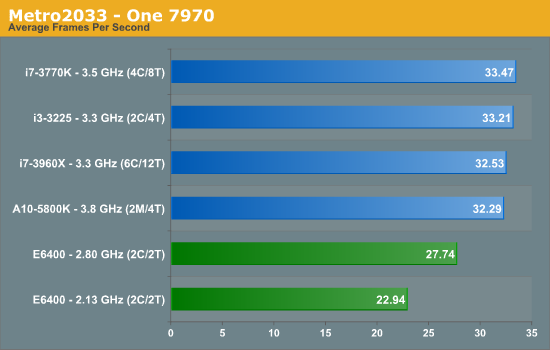
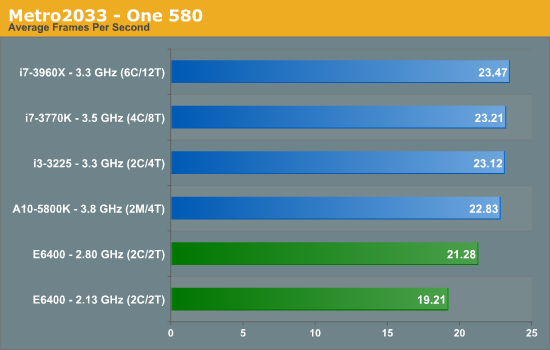
While an admirable effort by the E6400, and overclocking helps a little, the newer systems get that edge. Interestingly the difference is not that much, with an overclocked E6400 being within 1 FPS of an A10-5800K at this resolution and settings while using a 580.
Dirt3
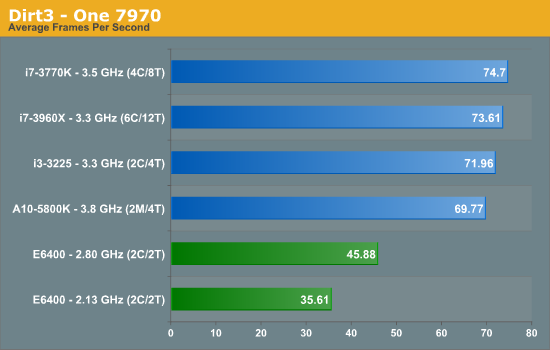
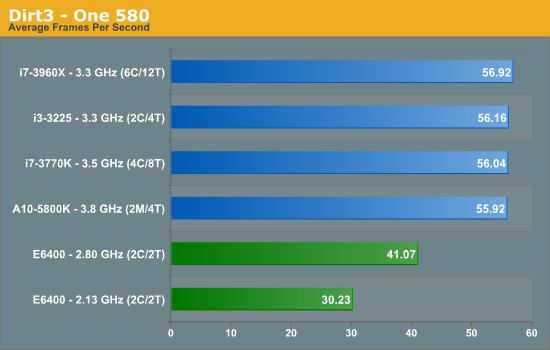
The bump by the overclock makes Dirt3 more playable, but it still lags behind the newer systems.
Computational Benchmarks
3D Movement Algorithm Test
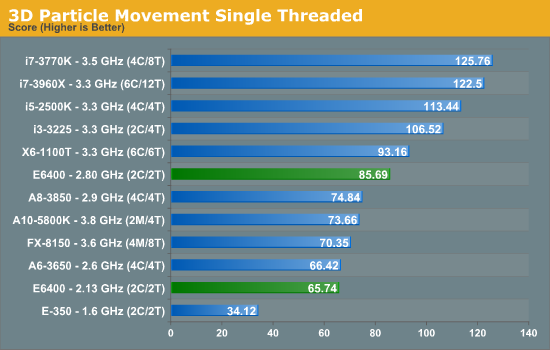
This is where it starts to get interesting. At stock the E6400 lags at the bottom but within reach of an FX-8150 4.2 GHz , but with an overclock the E6400 at 2.8 GHz easily beats the Trinity-based A10-5800K at 4.2 GHz. Part of this can be attributed to the way the Bulldozer/Piledriver CPUs deal with floating point calculations, but it is incredible that a July 2006 processor can beat an October 2012 model. One could argue that a mild bump on the A10-5800K would put it over the edge, but in our overclocking of that chip anything above 4.5 GHz was quite tough (we perhaps got a bad sample to OC).
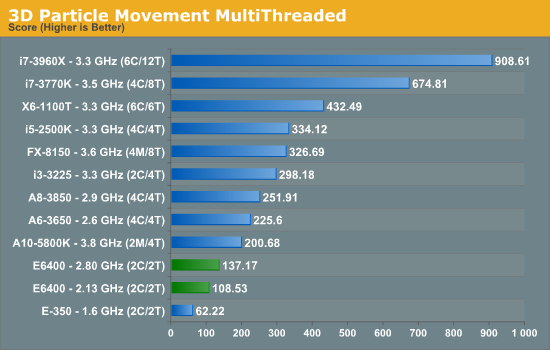
Of course the situation changes when we hit the multithreaded benchmark, with the two cores of the E6400 holding it back. However, if we were using a quad core Q6600, stock CPU performance would be on par with the A10-5800K in an FP workload, although the Q6600 would have four FP units to calculate with and the A10-5800K only has two (as well as the iGPU).
WinRAR x64 3.93 - link
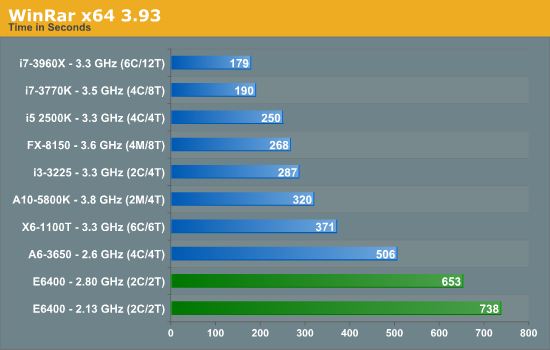
In a variable threaded workload, the DDR2 equipped E6400 is easily outpaced by any modern processor using DDR3.
FastStone Image Viewer 4.2 - link
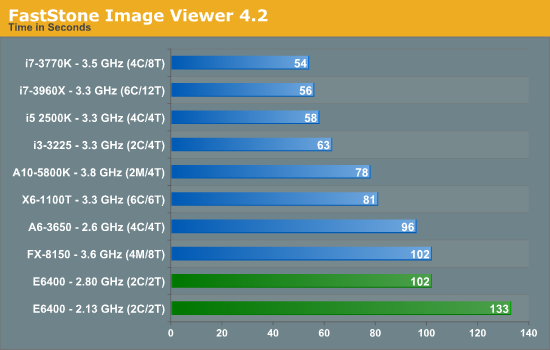
Despite FastStone being single threaded, the increased IPC of the later generations usually brings home the bacon - the only difference being the Bulldozer based FX-8150, which is on par with the E6400.
Xilisoft Video Converter
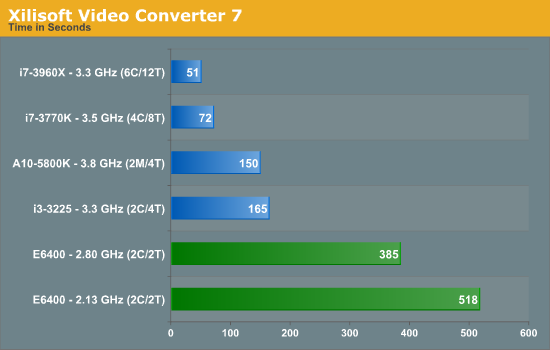
Similarly with XVC, more threads and INT workloads win the day.
x264 HD Benchmark
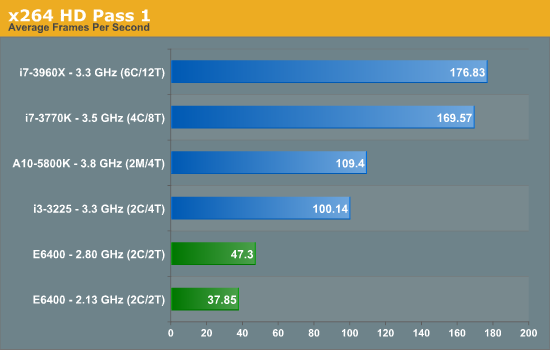
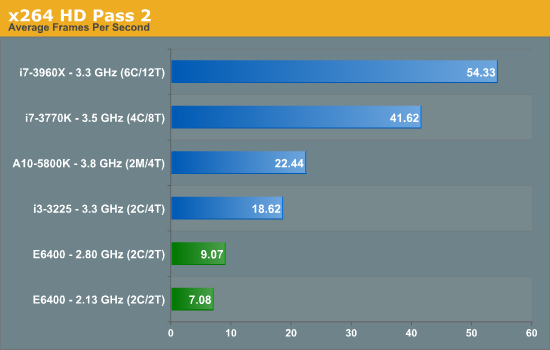
Conclusions
When I start a test session like this, my first test is usually 3DPM in single thread mode. When I got that startling result, I clearly had to dig deeper, but the conclusion produced by the rest of the results is clear. In terms of actual throughput benchmarks, the E6400 is comparatively slow to all the modern home computer processors, either limited by cores or by memory.
This was going to be obvious from the start.
In the sole benchmark which does not rely on memory or thread scheduling and is purely floating point based the E6400 gives a surprise result, but nothing more. In our limited gaming tests the E6400 copes well at 2560x1440, with that slight overclock making Dirt3 more playable.
But the end result is that if everything else is upgraded, and the performance boost is cost effective, even a move to an i3-3225 or A10-5800K will yield real world tangible benefits, alongside all the modern advances in motherboard features (USB 3.0, SATA 6 Gbps, mSATA, Thunderbolt, UEFI, PCIe 2.0/3.0, Audio, Network). There are also significant power savings to be had with modern architectures.
My brother enjoys playing his games at a more reasonable frame rate now, and he says normal usage has sped up by a bit, making watching video streams a little smoother if anything. The only question is where Haswell will come in to this, and is a question I look forward to answering.


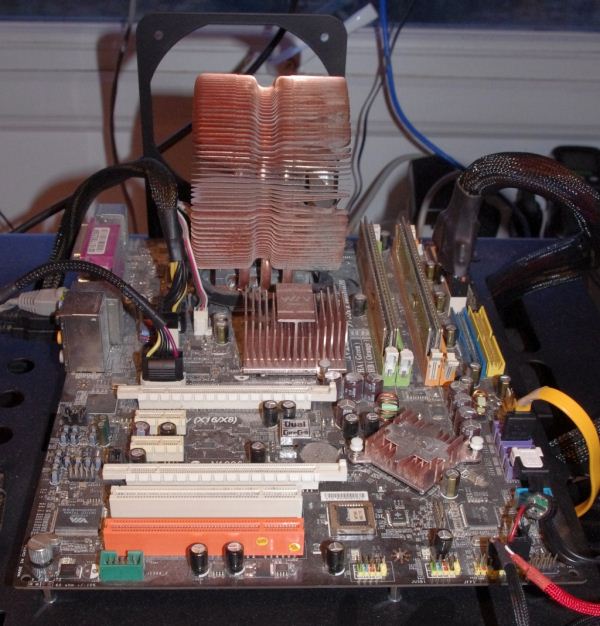








136 Comments
View All Comments
CajunArson - Tuesday, January 15, 2013 - link
I have an e8400 OC'd to 3.6Ghz and the same cooler you have :-)Thanks for posting these results since it is much more realistic to have people doing an upgrade from a Core 2 to Ivy/Haswell/Piledriver than it is to have somebody who just ran out and got a high-end Ivy Bridge 2 months ago to upgrade to Haswell.
Despite all the talk that modern CPUs aren't getting any faster, your benchmarks make it clear that even in single-threaded performance there is a big step up from Core 2 to more modern systems, and Haswell will continue the trend.
lyeoh - Tuesday, January 15, 2013 - link
Yeah I agree. This review is very useful. A few more benchmarks might be interesting - e.g. office, sysmark benchmarks with an SSD (just to see which improves things more).The hardware vendors might like it too - helping to convince more people that it's time to replace their trusty old Code 2 Duo system. ;)
NichrolasHoult - Wednesday, January 16, 2013 - link
Love my job, since I've been bringing in $5600… I sit at home, music playing while I work in front of my new iMac that I got now that I'm making it online(Click on menu Home)http://goo.gl/yiQsl
Happy New Year!
jsmi3413 - Sunday, March 3, 2013 - link
ID10TAlucard291 - Thursday, January 17, 2013 - link
The reason why there aren't any more benchmarks is because they counter the conclusion that the author wanted to make.The conclusion that was made before the review was written.
I especially love how the author picked Metro 2033 (the worst optimised game in history of gaming) for this review.
Lord 666 - Thursday, January 17, 2013 - link
Well said. The E6400 rig with SSD is still well suited for browsing, email, office tasks, and overall general home/small business tasks.Alucard291 - Friday, January 18, 2013 - link
And even light gaming. I mean the majority of indie games will run on that without a problem. And these days indie games are pretty damn good.ThisIsChrisKim - Monday, November 25, 2013 - link
I upgraded from a C2D E6300 to a i5-3570k for the sole purpose of gaming, and the perceptible difference is substantial. Not to mention my SSD become much faster with the addition of SATA6 which isn't available on the previous platform. If games that are older than 2010 are being played, then an upgrade isn't necessary. But anything beyond that, a CPU upgrade is very very useful.IanCutress - Saturday, January 19, 2013 - link
The benchmarks run are the ones from my motherboard testing suite. Go look at the motherboard reviews to see the parity between the two. As part of those reviews Metro 2033 and Dirt 3 are my primary gaming benchmarks.As a trained scientist and academic with peer-reviewed and published papers, I should take offence to your supposition that a conclusion was made before anything was written. No definite conclusion was made before testing began at all - only that the newer platforms would perform better in the testing suite. If you know more about my presupposition before testing than I, then praise be your powers of clairvoyance - there are institutions that will pay good money if you can prove it under laboratory conditions. If anything I thought the gap between C2D and the modern Ivy Bridge would be larger than the results I got, and the 3DPM ST result stunned me to begin with.
In case you missed it, the brief overview was to see how much of an upgrade my brother got in terms of my normal testing routine.
Ian
jsmi3413 - Sunday, March 3, 2013 - link
Well said, Ian! Have you ever noticed how some people like to make rediculous statements in this and other forums, just to try and get an arguement started?I thouroughly enjoyed reading the results of your comparison. I am using An HP Pavilion Entertainment Laptop PC with a Core2Duo processor. It is still great for word processing, spread sheet, database and email tasks as well as surfing the web. I do not play games. This laptop serves my purposes perfectly and I do not plan to upgrade, except maybe for the operating syste, This laptop shipped with Vista.